- Home
- Shirley McKay
Queen & Country Page 6
Queen & Country Read online
Page 6
‘He has not had his supper yet.’ She coloured as she realised what it was she said. ‘I am busy, sir. I must take up the tray.’
‘I will carry it for you.’
‘No, you must not.’
But she could not prevent him from following upstairs. She did not turn at the top to enter the great hall, where the soldiers were quartered, but continued up a second flight, which opened at its head to a gallery of doors, all of which were closed. On the floor by one of them sat the tray of supper things.
‘Let me hold the door for you.’
Trouble and confusion blotted her white face. ‘Hush now, and be gone with you, you must wait below.’
Before he could come to her, Blue Coat appeared, his blue coat undone, woken in a flurry as he slept upon his watch. Swearing at the girl, he moved to raise his hand. Hew intercepted quietly, with just sufficient emphasis to show that it was meant, ‘Know that if you strike her, I will knock you down.’
The boy lunged at Hew blindly, showing a fright that was not caused by him. ‘You cannot go in there. You don’t understand.’
‘Let me see him now, or if he will not see me, let him send me away himself. What should I tell his father? That he does not speak or eat? Does he have the plague?’ Hew inquired ironically. In truth, he found it strange. It pricked him into fear.
The boy was desperate now. ‘It is not the plague. But there are soldiers in the house. They will hear you.’ He waved at the girl, ‘Go now, leave the breakfast things.’ She dropped her tray and fled.
‘There are soldiers in the house,’ Hew repeated, ‘whose attention you do not wish to attract. Why is that, I wonder?’
‘It is not what you think. My master is engaged in an important work. He has given me instruction that he must not be disturbed.’
Phelippes had a temper, and was capable of sending his own servant damned to Hell. Hew felt a twinge of pity for the man. ‘I do not believe that you have told him I am here. Was that your instruction from Sir Amias Paulet?’
Blue Coat answered miserably. ‘Sir Amias does not know how vital this time is. And he is not my master, with respect.’
Hew said, ‘Even so.’ But before he could embark upon a more convincing argument, the door flew open from inside, and out came Thomas Phelippes, loud and in the life, calling for his boy. Hew found he was at last, absurdly pleased to see him.
Blue Coat stammered, ‘Pardon, master, if we have disturbed you.’
Phelippes merely grinned at him. ‘No matter, for the work is done. Run up to the house at Chartley. Tell Sir Amias to send down the post boy when he comes. For I have a packet for him.’ He saw the boy’s face, grey as the flap of his half-buttoned shirt. ‘What is the matter, Hal?’
Hal stuttered, ‘Him’, and Tom, for the first time, glanced towards Hew.
‘Hew. You. Come, come inside. Come within, at once.’
Tom had a mind that worked quickly. But it could not, Hew understood, have come at that moment to the right conclusion, or he would never have allowed him to have stepped into that room. Tom believed, in that moment, that Walsingham had sent him. By what other means could he possibly have come? Perhaps it was from tiredness, or exhilaration, he let drop his guard. Perhaps the fault was Walsingham’s, who chose to share so little of his workings with his principals, that they were never certain who was on their side. Perhaps it was, quite simply, that he trusted Hew. Whatever was the cause, he let him see the work he did, and, within a heartbeat, realised his mistake.
Thomas had not slept. If he had undressed, it was to still the sweat that trickled from his brow on a warm summer’s night, his sleeves and doublet folded, cap upon its peg. The candles in their sockets had been burned down to their stumps, counting in the corpses fallen from their ranks the profits from their work. Phelippes through the night had been writing letters, though the letters he had left, in packets by the bed, meant more than what was said in them. Hew, who had spent hours on ciphers, understood at once.
The packets had been sealed, and tied up with thread. There were ways, Hew had learned, of breaking a thread, and a seal, so that the fracture might not be detected. There were methods, too, of tying a thread, and of folding a paper under its wax, that ensured that those fractures were not undetected, and he had no doubt that Phelippes had applied those methods when he made his seal. On the outside of the packet, he had written the direction. Besides it he had sketched, with the last flick of his pen, an image of a gallows. Hew understood the mark. It was a warning to the post boys, few of whom could read, that the packet was an urgent one; post haste for life, it meant, and no more than that. Yet Hew had the impression that those few concluding strokes might mark in their decisiveness the closing of a game, and end in hang-the-man. Phelippes had left out a letter set in cipher, too precious to be trusted to the common post. In places, it appeared the ink was wet, but that could not be so, for it was evident to Hew that it was one of the originals that Phelippes had transcribed. Besides it lay the alphabet, and both were written neatly in an unfamiliar hand. A fascination drew Hew to the desk. He could not help but whisper, ‘Is that cipher hers?’
Phelippes asked, ‘Why have you come?’, his grey eyes drawn narrow with doubt.
‘I have a letter for you, Tom. It concerns Mary. I am sorry to say that the news is not good.’
The colour fled from Phelippes’ face. He looked blank, uncomprehending. ‘Mary?’
‘She has lost the child.’
Tom let slip a sound that was something like a sigh. He was thinking of that queen his purpose was to ruin, and in that moment had forgotten that he had a wife.
Chapter 5
The Lion and the Hare
That queen, Phelippes called her, sounding it like Cicero, accusing and direct, to mark her from the proper one, the Sovereign queen Elizabeth. Hew had met that queen in 1584. Though he had not expected it, it did not come about by chance. She had been in the keeping of the earl of Shrewsbury. And although she had complained of restrictions on her liberty, she was granted freedoms then which since had been withdrawn, and which she had already known were coming to their end. At that time, she had held hopes, of her son in Scotland and her friends in France, and Walsingham designed to penetrate those hopes, and shape them to his own, before he snuffed them out. To that end and purpose, he had ventured Hew.
For as long as Hew had known him, William Phillips had been plagued with a cruel arthritis. In the springtime of that year, a dampness from the river crept into his bones and ravelled them in knots. Clysters were prescribed, but offered no relief, and a raft of purging swept him to his bed, clinging to his blankets, through the bitter winds that blasted into March. Hew had written to his sister, asking for a remedy, and Meg sent by return a receipt for oil of comfrey, to be rubbed into the joints, and for nettle broth, infused with bittersweet. The old man was suspicious, and had baulked, at first. But Frances in her quiet way had followed Meg’s instructions, ordering the ointment and the herbs from the apothecary, searching at the river banks and edges of the parks for the sweetest nettle leaves, with her tender fingers nipping out their hearts, gently steamed and simmered in a grassy stew. William had been melted by it, when the muddy potion he had sipped to please her brought a cooling solace to his aching limbs, while the rubbing ointment warmed and soothed his bones. In the month of June, Phelippes had proposed a trip to Buxton Spa, to take the waters there, to round off his recovery. ‘Frances and my brother John will take care of the trade, while you shall take Hew, to attend to your needs. I should come too, were it not for the husting at Hastings.’
Phelippes had been standing for Parliament, as the member of Hastings, to which he was duly elected. He had been put up for the post by Lord Cobham, to whose younger brother Phelippes was attached during his embassy to France. It was not clear if Phelippes stood with Walsingham’s approval or in spite of him, for Walsingham and Cobham grouped in different camps, but Hew had given up attempting to unravel it. He suspected Phelippes chased s
o many different threads that he did not know himself, when he doubled on his course.
William had resisted him at first. Derbyshire, he felt, was too far and remote. ‘There is water at Hastings, is there not?’
‘Not the healing sort.’
‘Bath is a closer resort. And, I am told, very fine.’
Phelippes had impressed upon him that the trip to Buxton might not be refused. He had arranged it through Sir Francis, with the kind intervention of Lord Burghley himself, that his father should stay as the guest of the earl. The names of three great personages, in a single breath, had blown away William’s objections.
In confidence to Hew, Phelippes had confessed the purpose of the stay. Derbyshire was known to be a papist enclave, and the well at Buxton, with its ancient superstitions, was a favoured watering place for hatching Catholic plots. ‘There they may be lax, apt to let their secrets drop as loosely as their hose. Bathe with them. Drink with them, make yourself known to them. You an exile from Scotland, out of step with the king. Your father was a Catholic too, you understand their ways. Seek nothing out, but make yourself close to them, quiet, insinuate, earning their trust. Report all you hear of threat to our queen.’
Though Phelippes had not lied to him, he had not told the truth. Thomas had in mind a more prestigious prize. ‘It is possible,’ he mentioned just before they left, ‘that someone in that house will attempt to contact you. If that happens, I would counsel you to follow your own heart, and what will out, will out.’
Hew had set out in a spirit of adventure, on a journey which had turned into an arduous one. William was not fitted to the rigours of the road, and had suffered a relapse, as soon as they arrived, taking to his bed. They had not been quartered in the Buxton hall – Thomas had exaggerated, or spent out his influence – but in a smaller lodging house, a short walk from the baths. Hew’s sharp eyes had taken note of soldiers on the route; their papers were examined with a strict security that caused him some concern, but there was little sign of traffic or of bustle in the street. He had entered the earl’s hall, to be welcomed by the porter who was stationed at the door, and who functioned also as the keeper of the baths.
‘You must subscribe your name in the register, here, and beside it, the place you are come from. Next, you will see the doctor, who will make assessment of your present state of health, and will prescribe you your treatments. You pay for your treatment according to your rank, and to the charges there.’
The charges, which were painted on a board, ascended from a pittance for a pauper to considerable amounts for the highest in the land. A poor man paid fourpence, an archbishop, the sum of five pounds. The archbishop of St Andrews, the wily Patrick Adamson, had come to spend a winter in the south of England, ‘for benefit of health’. His passport application, sent to Francis Walsingham and passed by Laurence Tomson, had been shown to Hew. So snivelling and villainous a missive from a Scotsman he had seldom seen. Scotland was too cold, he should have said too warm for him, to ensure his comfort at that present time. It tickled Hew to think that he might come to Buxton, and pay high for the privilege. Patrick’s sparring partner, the reformer Andrew Melville had been driven down to England later that same year, fleeing the Black Acts. ‘Also for his health,’ Phelippes noted grimly. While Melville had found refuge among willing friends in Oxford, Hew felt relief that their paths had not crossed.
As to himself, he had felt at a loss. He did not feel equipped to call himself a gentleman. He had entered in the register, ‘William Phillips of Leadenhall, London, customer of wool’, and below that, ‘Hew Cullan of St Andrews, lawyer, servant to the same’, and handed back the quill. The physician, he was told, had been called out to the baths, but would soon return, if he cared to wait.
The keeper had for sale certain books and pamphlets to inform his guests, and Hew had bought two copies of a tract by Doctor Jones, on ‘The Benefit of the Ancient Baths at Buckstanes which Cureth Most Grievous Sicknesses’, one to keep himself, and one to give to Giles. It occurred to him that he might make a cipher of the text, and send a secret letter, under Phelippes’ nose. Phelippes would no doubt have approved the sentiment, if not the act itself, as becoming to a spy.
At the back of the hall, where sunlight came glancing from several large windows, were set out some tables for board games and cards, and a shelf with a small row of books. There were several chairs, and a bright bow window seat, where Hew sat down to read. He had not gone much further than ‘A Rule to Know when Exercise Should Begin’ (the colour of the urine was apparently the key) when he had been distracted by the lighting of the sun upon a line of letters, delicate as frost, etched upon the window under which he sat. The gentle men and women who had watered in that place, having time and leisure on their hands, had whiled away the spare hours writing in the glass, with the pointed bezels of their diamond rings. There were verses, anagrams, among the hearts and flowers, the open secret record of a lover’s trysts and tiffs. But what had held him rapt were those that bore the signature of the queen of Scots. For they were bitter notes, plaintive to the pith; not the tender linnet, singing in its cage, but the restless lion, rattling at the bars. It brought to mind the king of Scotland, and his pale menagerie.
‘Et dejecto insultant lepores leoni’, Even the hares will taunt a dead lion. The words were defiant and proud.
‘I see you like to read. Perhaps you will excuse us for our lack of library? On command of our dear queen, our public shelves were stripped of all that might appeal to Roman Catholic tastes. Those interests were diverse, or else the censors scrupulous, for there is little left.’
Hew had been engrossed, and had not been aware of the approach of the physician. It was far from clear, from the doctor’s tone, whether he approved or not of the queen’s efficiency. Hew rose to take his hand. ‘Are you Doctor Jones?’
‘Alas, not. I am Samuel Forrester, the physician here. I am not so favoured as my famous colleague. It seems you are familiar with his work.’
‘I have not got far with it,’ Hew had admitted. ‘According to the title, the waters in this place cure “most grievous sicknesses”. What does that mean? Most grievous sicknesses, or most grievous sicknesses?’
The doctor had answered him, ‘Indeed,’ with the smooth prevarication Hew was well acquainted with in men of his profession. ‘If you care to read the whole, you are sure to find it most apt and illuminating.’ Despite his clipped English accent, and his pinched and narrow features, something in his manner had reminded Hew of Giles. He had felt – felt even now – a sudden lurch of homesickness.
‘If you will follow to my cubicle,’ the physician had proposed, ‘there I can examine you.’
‘Ah, it is not I, but my master is unwell. He has taken to his bed.’
‘Where I shall see him presently. Oftentimes, the journey here exacerbates old ills. Do not be alarmed, for it will quickly pass. As for you yourself, you must be cleared of sickness before going to the baths. And, if I may say so, you do not look well. Have you lost weight?’
They were out of earshot now, in the doctor’s cubicle, and Hew had dared to say, ‘I was looking at the writing on the glass.’
‘Hmm?’ The doctor had his back to him, writing in a book.
‘On the window pane.’
‘A frivolous pursuit. Do you have a cough? The croup? Persistent rheum?’
‘None of those. Am I right when I suppose that Mary, queen of Scots has written verses there?’
‘That is more than likely. Have you ever suffered from the great or little pox?’
‘Never, God be thanked. Is she often here?’
‘Not so often, no.’ The doctor had perused him sternly through his spectacles, and Hew had been expecting him to offer some rebuke, when he had remarked, ‘If I were a man, who fished before a net, then I should place a wager she will come here very soon.’
‘Why do you say that?’
‘The house has been cleared, and guests turned away. That is a clear sign that she
is expected. But sir, this cannot be news to you. No one who is properly a stranger to the earl could presently be here.’
‘My master must have known of it,’ Hew had reflected, ‘while, I confess, I did not.’ By master, to be sure, he had not meant William Phillips. He had felt the rising of a kind of sick excitement that would not be stilled. He had thought that Doctor Forrester, physician as he was, would feel beneath his shirt the leaping of his heart, the flexing in his belly that was writhing like a fish. But the doctor had said simply, ‘Your master is assured of my best attention, since that lady, when she comes, will bring her own physician.’
‘Who must consult with you at times?’ Hew was fishing, quite shameless, for more than a hint.
That fish did not bite. The doctor cleared his throat, a harumph of reproach. ‘Indeed, and if he did, that confidence is not one I should ever break. I shall want, from you both, samples of spittle, water and stool. Until such a time as a regimen is set for you, drink three pints a day of water from the spring. You shall enter in the bath when all has been evacuated and the piss runs clear. Now, sir, that is all.’
The days had seemed interminable. Twice, the doctor called, and Hew learned that the queen and her party had arrived by night, and were quartered in the hall, where no man might pass without permission of the guard. The baths were closed off while the queen had use of them; at other times, the gentlemen were given leave to bathe according to the regimen the doctor had set out for them. On the third day of their visit, William had felt well enough to descend into the water, with assistance from Hew.
The bath house was set out with steps of marbled stone and benches by the fire, where clothes were left to warm and hot towels were supplied. On the first occasion, they were quite alone, but on the second there were two men in the far end of the bath, who climbed out as they entered, and as quickly dressed, conversing with each other quietly in French. One had stopped to bow to them, politely, as he passed. Hew had begun to despair of the relentless regimen, of lying lapped in towels or under steaming bladders forcing out a sweat, and most of all of drinking water, from the Buxton well. He felt his humours had been balanced to the point of equilibrium, where they cancelled out, and nothing had remained in him except a listless vacancy, shallow and lukewarm.

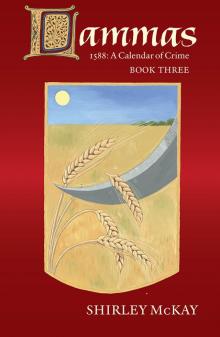 Lammas
Lammas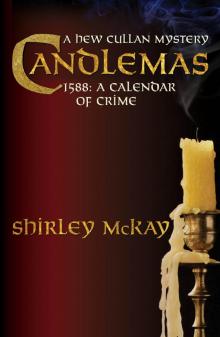 Candlemas
Candlemas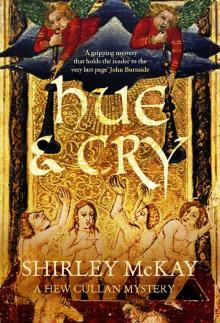 Hue and Cry
Hue and Cry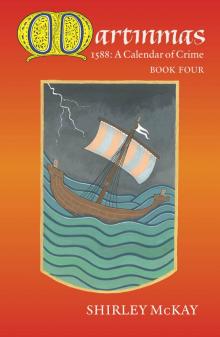 Martinmas
Martinmas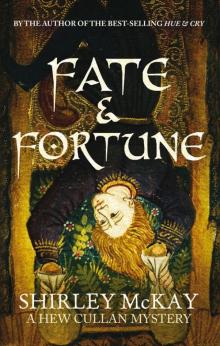 Fate and Fortune
Fate and Fortune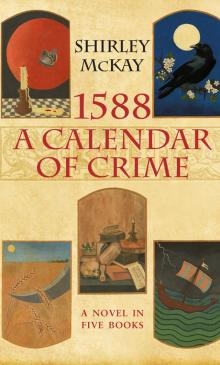 1588 A Calendar of Crime
1588 A Calendar of Crime Time and Tide
Time and Tide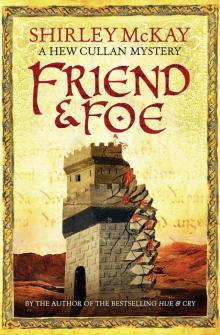 Friend & Foe
Friend & Foe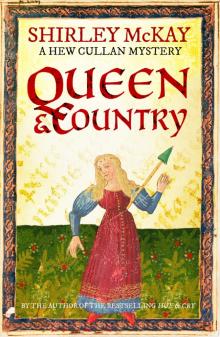 Queen & Country
Queen & Country